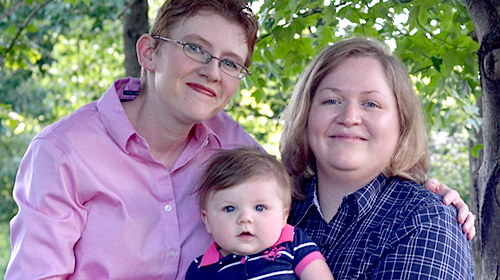
It used to be that the idea of gay people raising kids spooked lots of people, who thought of us only as pedophiles, not as parents. In fact, we lost a long series of court cases about the freedom to marry based on judges saying that straight folks were better for children, and therefore it made sense to exclude same-sex couples from marriage (huh?).
For instance, New York's highest court upheld the state's marriage law in 2006 by saying that "The Legislature could rationally believe that it is better, other things being equal, for children to grow up with both a mother and a father."
So it was refreshing to see a recent federal appeals court rule for gay people in one of the ACLU's freedom-to-marry cases by pointing to our kids. Noting that gay people have adopted a lot of children, the court made the common-sense observation that having those parents marry would be good for their kids.
This stunning change – from losing marriage cases because of judges' fears for the welfare of our children, to winning them because of judges' concerns for the welfare of those same kids – shows how deeply America's view of gay people has changed. The country has gone from thinking of gay people as deviant, overly sexualized beings, to recognizing us as regular folks and seeing our humanity. The shift is driving the massive change in public opinion about, and in the policy environment for, lesbians and gay men across the country.
The shift springs in large part from our increasing visibility: more and more people living openly as lesbians and gay men in all parts of their lives, more and more gay people raising children, and the growing prominence of the marriage issue in public discourse. As America learns more about gay people's lives, it sees us as neighbors, not perverts; as parents, not predators; and as families, not freaks. Now that the judiciary is starting to see us this way as well, I'm optimistic about more court victories for our equality.
It's promising that the Supreme Court is now considering petitions to review that recent marriage equality ruling – which involved the marriage laws of Indiana and Wisconsin – along with petitions in marriage cases from three other states: Oklahoma, Utah, and Virginia. The court could take up the issue as early as its conference on September 29th.
No matter which of these cases the Supreme Court chooses (and I think it's likely that it takes two), I'm convinced that the stories of our families and our children will be what moves the justices, and the country, toward our greatest legal victory yet.
Learn more about marriage for same-sex couples and other civil liberty issues: Sign up for breaking news alerts,, and .

